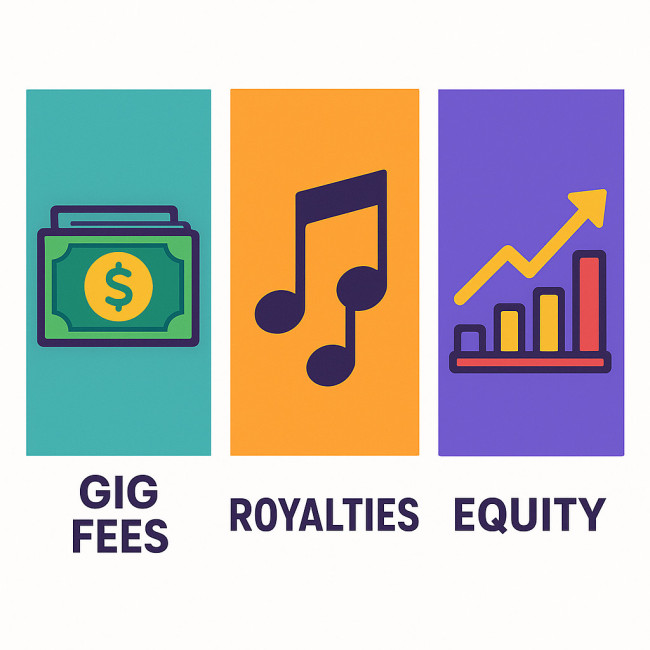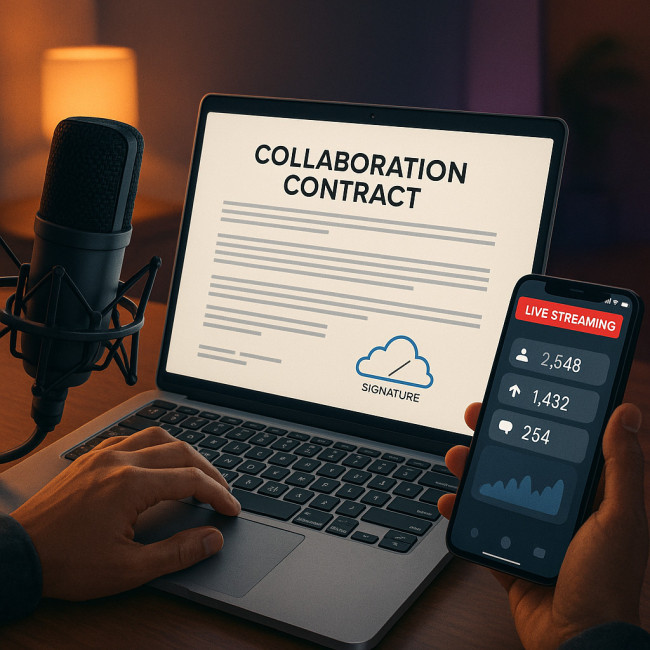Gigs, royalties, equity: negotiating singer collaboration contracts like a pro
Stop leaving money and rights on the table. Whether you join a one-night showcase or co-write an entire album, a crystal-clear contract is the only safeguard for your voice, your IP and your future income. In this guide you will learn how to compare gig fees, royalty splits and equity deals, which clauses to insist on, and the negotiation tactics that turn “nice to have” terms into signed advantages.
Why a written agreement matters more than ever
Streaming micro-payouts, viral short-form videos and remote recording sessions have multiplied the ways your vocals generate revenue. Without a contract, you can't prove ownership, enforce payments or license your work later. A concise written deal:
- Defines deliverables, timelines and payment schedules.
- Clarifies who controls masters, publishing and neighbouring rights.
- Protects you from unapproved edits or AI cloning of your vocals.
- Prevents scope creep that kills both creativity and morale.
Three remuneration models every singer should master

Before you dive into the detailed numbers below, step back and picture how these three revenue models shape your career arc. A flat gig fee feels immediate and tangible, but it stops working for you the minute the house lights dim. Royalties are slower to materialise yet keep dripping into your account long after the release, building a passive-income cushion that buys creative freedom. Equity is the moon-shot: less predictable, but transformative when it hits. Understanding how risk, effort and upside move across the spectrum helps you choose the deal that matches both your current needs and your long-term strategy.
1. Gig fees: upfront cash, no strings attached
A gig fee is a one-off payment for a defined service: live show, session vocal, demo track. It's perfect when you need immediate cash and aren't invested in the song's long-term performance.
| Scenario | Typical fee range (USD) | Pros | Cons |
|---|---|---|---|
| Studio demo (no release) | $150 – $400 per song | Fast cash, low admin | No future income |
| Live corporate gig | $500 – $5 000 per night | Predictable budget | Travel & rehearsals rarely paid |
| Remote session vocal | $200 – $800 per stem pack | Work from home | No credit if NDA-bound |
2. Royalties: earn while you sleep
Royalties link your income to future usage. Common slices include:
- Mechanical (streaming & downloads)
- Performance (radio, clubs, public venues)
- Sync (film, games, ads)
A typical indie split starts at 20 % of the artist share for a featured singer, but can rise to 35 % when you bring songwriting chops or a proven audience.
3. Equity: skin in the project's long game
Equity grants you ownership units—often in a single track's master or a new label imprint. You sacrifice upfront cash for bigger upside if the project blows up. Equity clauses must define dilution, exit options and valuation triggers.
Seven contract clauses you can't skip
- Scope of work: vocal range, language versions, promotional duties.
- Credit line: exact spelling and platform placement.
- Payment schedule: deposit, milestones, late-fee interest.
- Royalty & equity definition: percentage, share class, recoupables.
- Exclusivity window: how long before you may re-record or perform the song elsewhere.
- Approval rights: mixes, artwork, marketing uses (e.g., AI voice cloning).
- Termination & dispute resolution: kill-fee formula, jurisdiction, mediation order.
The negotiation roadmap
Step 1 — Research realistic benchmarks
Dig into PRO rate cards, the budget filter data many planners publish, and public royalty databases. Knowing the market average anchors your ask in credibility.
Step 2 — Build leverage before you talk numbers
Showcase hard metrics: monthly listeners, sold-out gigs, press quotes. Tools such as directory analytics that predict booking potential turn vague popularity claims into quantifiable value.
Step 3 — Draft, red-line, repeat
Send a balanced first draft instead of a wish list. Red-lining signals professionalism and saves weeks of “who edits first?” ping-pong. Not fluent in legalese? Pair up with template services or an entertainment lawyer who charges by clause, not by hour.
Red flags that scream “walk away”
- “Work for exposure” offers locking you into exclusivity.
- Unlimited term plus 360° share of merch and sponsorship.
- Recoupables vague or capped “at label's discretion.”
- No audit clause on royalty statements.
Tech & admin tools that keep deals smooth

Digital paperwork may not sound glamorous, yet it is the backstage engine that prevents deals from stalling. Imagine finalising split sheets in minutes because every stakeholder can e-sign from a phone, or auto-generating session reports that merge your DAW metadata with time-stamped performance notes. Add a dashboard that scrapes your follower counts and tour dates in real time, then places those metrics directly inside a proposal PDF. Suddenly you have proof of value, tighter deadlines and verifiable audit trails, all without leaving your rehearsal space. That administrative polish can impress a cautious label exec as much as a flawless high C.
Streamline paperwork with cloud signature apps, session-report templates, and dashboards that pull your live stats directly into proposals. Listing on trusted platforms—such as singer collaboration listings—also reassures partners that they're working with a vetted professional.
Need to polish your public profile before the next negotiation? Tap quick wins from credibility-boosting directory badges or upgrade imagery following image optimisation principles that convert.
FAQ
- Do I still need a contract for a free collaboration?
- Yes. Even zero-fee projects raise IP, credit and usage issues that a short form agreement should cover.
- How often should royalty statements arrive?
- Quarterly is the indie standard; major labels may report bi-annually. Insist on electronic statements plus audit access.
- Can I ask for both an upfront fee and royalties?
- Absolutely. A modest session fee plus smaller royalty share balances cash flow and long-term upside.
- What percentage is fair for equity in a new label imprint?
- Ranges span 2 %–10 % depending on your role. Push toward the higher end if you bring finished masters or significant fan reach.
- How do I protect my vocals from AI misuse?
- Add a clause that bans machine learning training without written consent and sets statutory penalties for breaches.
Quick self-test: are you negotiation-ready?
Next step
Put today's insights into action. Draft a one-page contract outline, list your non-negotiables, and share it with a trusted peer for feedback. The sooner you negotiate like a pro, the faster your voice compounds into lasting revenue.
Ready to elevate every deal? Bookmark this guide, then refine your online presence using the internal resources linked above. You'll walk into your next collaboration armed with data, clarity and confidence.











